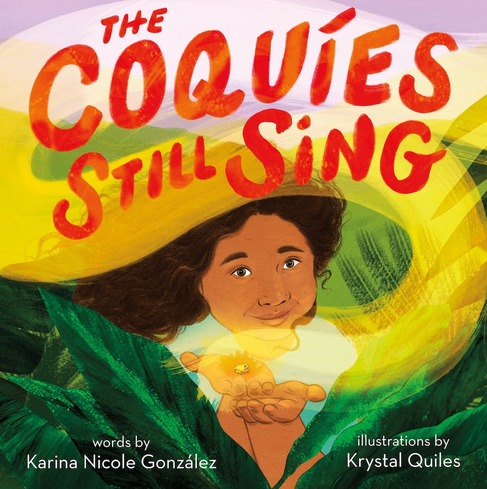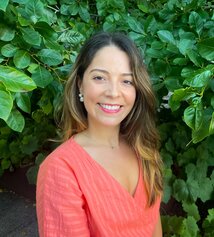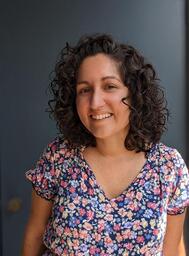|
Happy Book Birthday to The Coquíes Still Sing by Karina Nicole González! Andrea: Karina, I just want to start off by saying how wonderful it was to read a picture book about Puerto Ricans that is set in Puerto Rico. With the majority of US published Latinx kidlit taking place in the continental United States, what made you want to write a book set outside of it? Karina: That’s an interesting question. When I first drafted this story, I had intended to move Elena and her family out of Puerto Rico following Hurricane María, because we were hearing so much about young families leaving. But at the suggestion of my agent and her editorial assistant, they urged me to keep the story situated in Puerto Rico, and that made me rethink everything including what was guiding my decision to uproot their lives. Often, we hear about the experience of Boricuas, like ourselves, who either moved here or had parents who moved here, yet we rarely hear about the Boricuas who stay, and they stay for a multitude of reasons beyond the typical assumption that it’s because of poverty. But when Hurricane María happened, my Abuela chose not to leave, not because things weren’t difficult -- her situation was absolutely cruel. She didn’t have electricity for 6 months! As a 79 year-old woman at the time, that was so tough. But she wanted to stay because she loves Puerto Rico, and couldn’t imagine living anywhere else for an extended period of time. So it made sense to write a story in which a family remains and restores what is theirs. Elena and her family love their home, their community, their pueblo, like my Abuela – and I think that kind of depiction is not only honest but presents an underlying political message. The will of the people will not be extinguished by natural disasters or human-caused blackouts, or even the gross exploitation of colonialism. My maternal great-grandparents cultivated coffee, tobacco, and sugar cane on farms in the early 1900s – most of our families at some point dug their fingers into the soil and worked the land. And I don’t think that’s something we should forget or let go of. Andrea: Absolutely. None of my family left, and it was hard, watching from the States as my mom and brother and extended family all navigated the aftermath. Because truly - the island was completely changed. María didn’t just destroy buildings and roads, it did some serious damage to the flora and fauna of Puerto Rico. I mean, I remember even the bees were gone! What made you want to focus on the coquí, specifically, for your story? Karina: The coquí is endemic to Puerto Rico, and so I think that partly fuels our adoration for the species, but I think it goes even beyond that. Coquí symbols were carved into rocks by the indigenous people of Borinquen hundreds of years ago. That’s how ingrained they are in our culture! It’s a tiny amphibian with a powerful mating call that can be heard from many meters away. When the coquí sings ‘co-quí’ [ko-KEE], we interpret that sound as them saying “I’m here” – and that is kind of what they’re saying. Eminent researcher and professor, Dr. Rafael Joglar, explains that when the coquí sings ‘co,’ they’re asserting their territory to the other macho coquíes, and when the coquí sings ‘quí’ they’re letting the female coquíes know that they’re ready to mate. Coquí = I’m here I titled the book, “The Coquíes Still Sing,” because after Hurricane María their mating call fell silent. We were all alarmed by that silence, and their absence was terrifying because their existence feels tied up with ours because they have been around for as long as us, and perhaps even longer. “The Coquíes Still Sing” is a literal title, yet also symbolic. With it, I’m also saying that the people still sing, too. It’s a mirroring of sorts. The world fixes their gaze to a place and people in the wake of a disaster, yet turn away before they can tell their stories about how they overcame each hardship and found a way to smile again. Andrea: You are so right. And that’s why I particularly loved how you used both your book and social media in the week leading up to your debut as a time to showcase the grassroots organizations based in PR that were (and still are) actively advocating for change. How were these organizations important in the wake of the hurricane and why is it important people continue to support them now? Karina: When Hurricane María made landfall, I was living in Brooklyn and had just started a new job as a school-based speech-language pathologist. I had previously been involved in the activist community of Boricuas here in NYC because I was concerned with all of the austerity measures that were being thrusted upon the population without their consent. So when María happened, a group of us shifted our attention to organizing fundraisers for different grassroots organizations in Puerto Rico like Comedores Sociales, which had been providing meals to people who lived in mountainous regions. So many elderly people were unable to access food or transportation! When “The Coquíes Still Sing” was acquired, editors Luisa Beguiristaín and Connie Hsu were immediately supportive of my request to include as many of these orgs that I could fit on one page! I think that whenever any of us get a chance to create art, to write, or to speak at an event for the public’s consumption, I think it’s important to acknowledge people who are engaged in community work. Many of the people who are engaged in the community work I reference in my book, do so out of genuine interest and love. I know this because I have met some of them! They deserve all of the support and spotlight. Andrea: The organizations aren’t the only information you provide in your book. You actually include a lot of back matter. It reminded me of Yuyi Morales’ Bright Star, which also offers a lot of context and history at the end. How can adults help kids access this information and why was it so important for you to include it? Karina: Yes, this backmatter is definitely geared for adults who are engaging in guided reading or for an older child. I think it would be an injustice to not provide the reader with greater context about Puerto Rico, what happened during Hurricane María, and the relationship between PR and the US. There have been so many awful mischaracterizations and disparaging comments made about Puerto Ricans in the corporate media world and by bigots online, and I wanted to create a book that can be a point of historical reference and a source of hope and pride. For students and families outside of Puerto Rico, this story can be incorporated into a conversation with kids of any age or even a history/geographical lesson about the Caribbean or natural disasters, which are common across the globe. Andrea: Yes, and those conversations are SO important! Does this have to do with why you chose a picture book as the medium for your story? Karina: During my first year as a bilingual speech-language pathologist at an elementary school, I sought out contemporary picture books that not only reflected racial diversity, but also stories that centered families from a working class background. Mi Papi Tiene Una Moto/My Papi Has a Motorcycle, by Isabel Quintero, was a favorite amongst my students because many of them have fathers who work in construction or ride motorcycles and bikes. They immediately connected to the text. That was a major lightbulb moment. Early reading experiences are so important because educators and parents can cultivate a love for reading by simply presenting stories that resonate with children. Shared reading also promotes bonding, whether between parent-child or teacher-student. It also promotes visual and emotional literacy! Unfortunately, there’s this assumption that picture books are only designed for children, but I think sophisticated picture books are for all ages. The shorter text and illustrations can trigger an adult’s imagination or even memories in an emotional way that an article or a longer form text might not be able to do. I think this is what makes the picture book genre so special. Andrea: You’re right. It is special. And I honestly feel so grateful to you for creating this wonderful story, and from a place of such thoughtful nuance and love. Thank you for sharing so much about The Coquíes Still Sing with us today and I look forward to seeing what other stories you have to tell. Be sure to check out The Coquíes Still Sing by Karina Nicole González today!
0 Comments
Leave a Reply. |
Las Musas SpeakWelcome to our blog! Archives
July 2024
Categories
All
|




 RSS Feed
RSS Feed